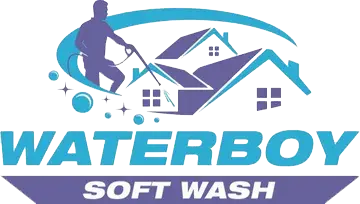Keeping outdoor spaces clean helps maintain the value and safety of a property, and concrete cleaning is a major part of that effort. In the middle of Chester County, PA’s lush neighborhoods and historic architecture, property owners often wonder whether pressure washing is a safe choice for all kinds of concrete surfaces. This question matters because, while concrete seems durable, not every surface can withstand high-pressure cleaning in the same way.
This article explains what concrete cleaning actually involves, the different types of concrete common throughout Chester County, and whether pressure washing is the right solution for each one. You’ll also find safer alternatives, best practices, and key factors that make concrete cleaning both effective and long-lasting.
Understanding Concrete Cleaning in Detail
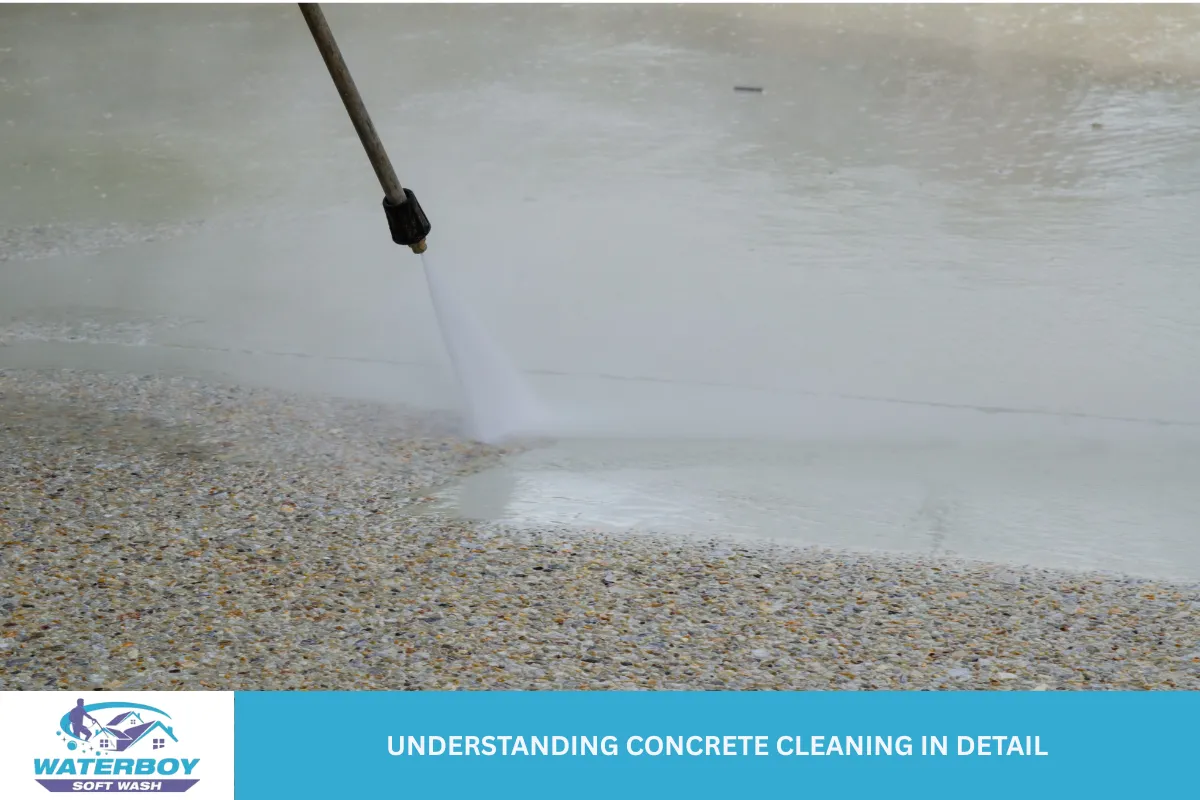
Concrete cleaning is the process of removing surface contaminants, including dirt, algae, mildew, mold, oil, rust, and stains, from concrete structures. These contaminants not only make concrete look older than it is, but they can also create slippery, hazardous conditions if left untreated. Cleaning restores both the appearance and safety of the surface.
Depending on the condition of the concrete and the type of stains present, different cleaning methods may be used. Some of the more common techniques include high-pressure washing, soft washing, surface scrubbing, or using biodegradable chemical cleaners. Each of these approaches has its benefits and drawbacks depending on the situation.
In Chester County, the weather plays a large role in how concrete accumulates dirt. Spring and summer can bring pollen and mildew, while the fall introduces leaf stains. In winter, road salts and moisture contribute to surface erosion and discoloration. Regularly cleaning concrete helps protect the surface from these seasonal effects and extends its lifespan.
Types of Concrete Commonly Found in Chester County, PA
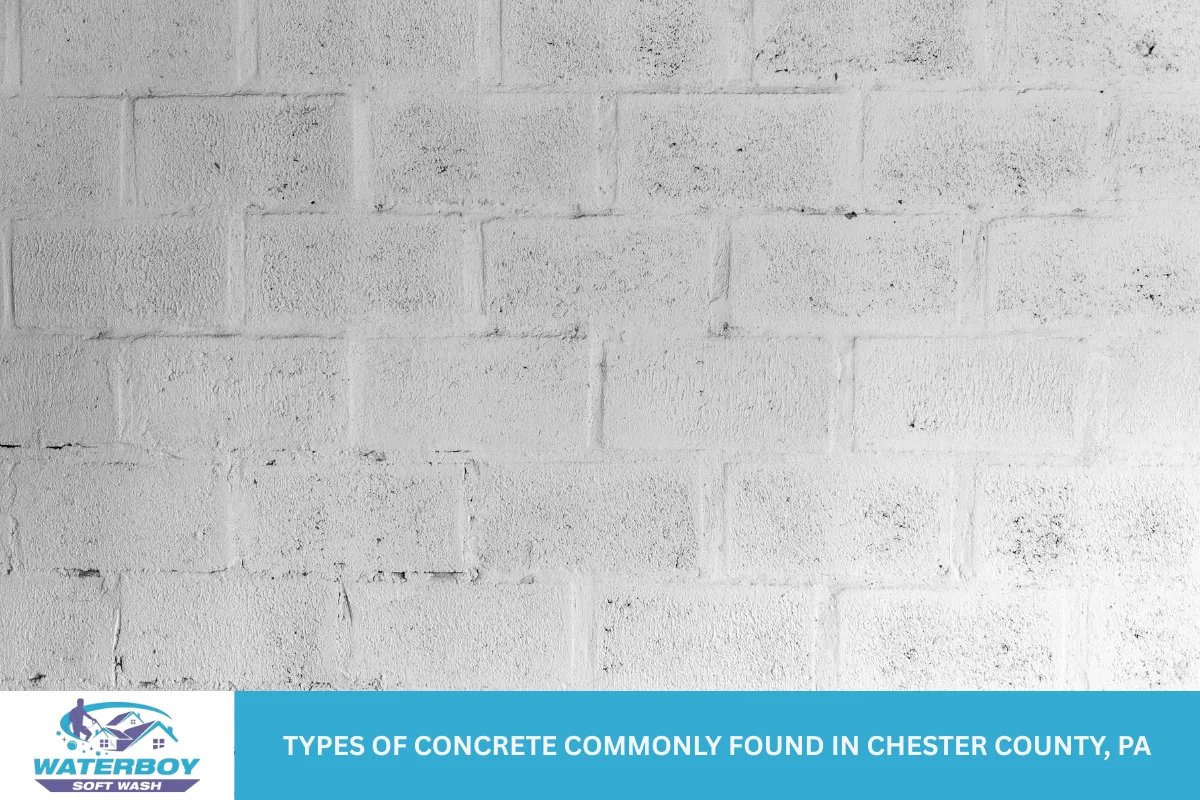
Concrete installations vary greatly across the properties in Chester County. Different neighborhoods, construction styles, and building ages all influence the type of concrete used in homes, commercial properties, and public areas. Here are the most common types of concrete you’ll find in the region:
Poured Concrete
This is the most widely used form of concrete for driveways, sidewalks, patios, and garage floors. It is formed on-site using molds and allowed to set in place. Poured concrete is generally smooth but can be finished in a variety of textures. While it’s known for being strong and long-lasting, it can develop surface cracks and absorb stains over time, especially if not sealed properly.
Stamped Concrete
Stamped concrete is designed to imitate materials like brick, stone, or tile. It’s popular for decorative patios, pool decks, and walkways. The surface is typically treated with a color hardener and sealer to protect the finish. While beautiful, stamped concrete is more susceptible to damage from pressure washing because the textured surface and sealant layer can be easily compromised.
Exposed Aggregate Concrete
This type of concrete features small stones or pebbles that are partially embedded in the surface. It provides an appealing texture and slip-resistant finish, making it a smart choice for driveways and patios. However, the exposed texture can trap dirt, mold, and debris more easily, requiring specialized cleaning tools and careful pressure settings to avoid dislodging the aggregate.
Concrete Pavers
These are individual blocks made of concrete, set closely together in patterns over a sand or gravel base. Pavers are popular in residential landscaping due to their custom look and ease of replacement. Cleaning pavers must be done cautiously, especially with pressure washers, because the force can loosen the sand joints or shift the blocks.
Aged or Weathered Concrete
In many areas of Chester County, particularly older neighborhoods, the concrete has been in place for decades. Aged concrete can be porous and more prone to cracking. Surfaces like these may already be compromised and can suffer further damage if cleaned with high pressure.
How Pressure Washing Works and Why It’s Popular
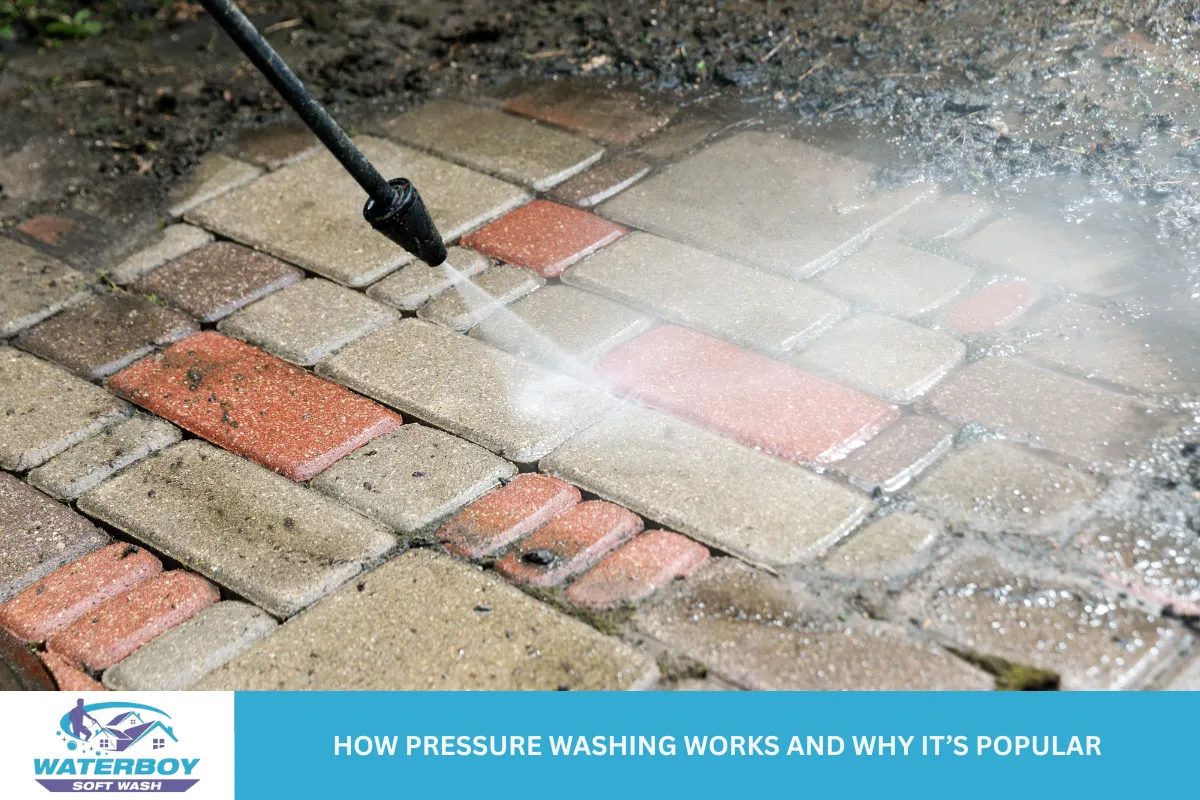
Pressure washing involves using a motorized sprayer to deliver water at very high pressure, typically between 1,500 and 4,000 PSI (pounds per square inch). This high-powered stream breaks apart surface buildup, lifting it from the concrete.
The technique is popular because it’s effective at quickly removing dirt, oil, mildew, moss, and more. It also often doesn’t require any chemicals, making it a water-only cleaning solution for many users.
For well-maintained, sealed, and relatively new concrete surfaces, pressure washing can produce striking results in a short amount of time. The process is especially useful for large, flat areas, such as driveways or walkways, where debris accumulates evenly over time.
However, its effectiveness depends entirely on the condition of the surface and how the pressure is applied. Using too much pressure or the wrong nozzle can harm even the strongest concrete.
Is Pressure Washing Safe for All Types of Concrete?
The safety of pressure washing depends entirely on the type and condition of the concrete being washed. While pressure washing is generally safe for some surfaces, such as newer poured concrete driveways or industrial floors, other types may suffer permanent damage if cleaned too aggressively.
Here’s how each surface responds:
- Poured Concrete: Generally safe when pressure settings are kept moderate and the surface is not already cracked or flaking.
- Stamped Concrete: Risky, especially if it’s sealed. Pressure washing can strip away color or sealer, resulting in fading or patchiness.
- Exposed Aggregate: Requires a delicate approach; too much pressure can dislodge the embedded stones.
- Concrete Pavers: Pressure washing can push out joint sand, destabilize the structure, and even shift the pavers if not done carefully.
- Old or Damaged Concrete: Not recommended. High pressure can worsen cracks or create new ones.
Potential Risks of Pressure Washing Concrete
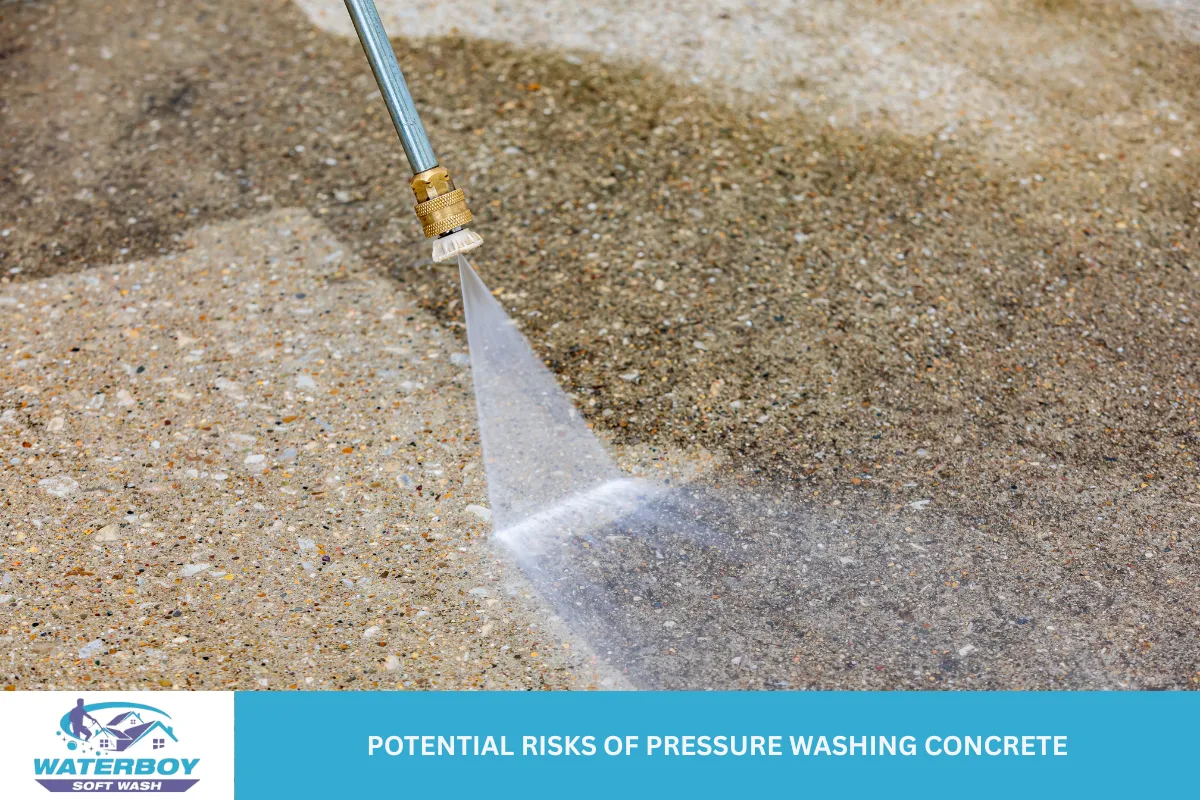
Using pressure washers improperly can lead to serious problems that may not be immediately visible. While it may seem like a straightforward task, cleaning concrete under high pressure introduces several risks:
Surface Etching
This occurs when the pressure is too strong and begins to carve into the concrete. The result is permanent marks, lines, or grooves on the surface.
Worsening Cracks
Even small surface cracks can expand when water is forced into them under high pressure. Over time, this can lead to more severe structural issues.
Discoloration
Stripping sealants or top layers can create uneven color patches, especially on decorative or stained concrete surfaces.
Joint Erosion
For pavers or slab joints, the intense pressure can blow out the sand or filler materials that hold the structure in place.
These risks are why many homeowners in Chester County have turned to gentler alternatives that protect both the surface and its longevity.
Safe and Effective Alternatives to Pressure Washing
Suppose you’re unsure whether pressure washing is safe for your concrete. In that case, there are safer alternatives that can still deliver excellent results. These options minimize surface damage while targeting the same stains and grime.
Soft Washing
Soft washing uses low pressure and a mixture of specialized cleaning solutions to break down dirt, mildew, algae, and stains. This method is especially suitable for stamped concrete, older patios, and surfaces with decorative finishes.
Biodegradable Cleaners
These eco-friendly solutions break down contaminants without the use of harsh chemicals. Many products are designed to be safe for plants, pets, and nearby water sources—making them a good fit for residential properties.
Rotary Surface Cleaners
These machines distribute water pressure more evenly than a standard pressure washer nozzle, making them safer for textured concrete or large open areas.
Manual Surface Scrubbing
For small problem spots, a stiff-bristled brush and appropriate cleaner can be highly effective without risking damage to the structure.
Best Practices for Cleaning Concrete in Chester County
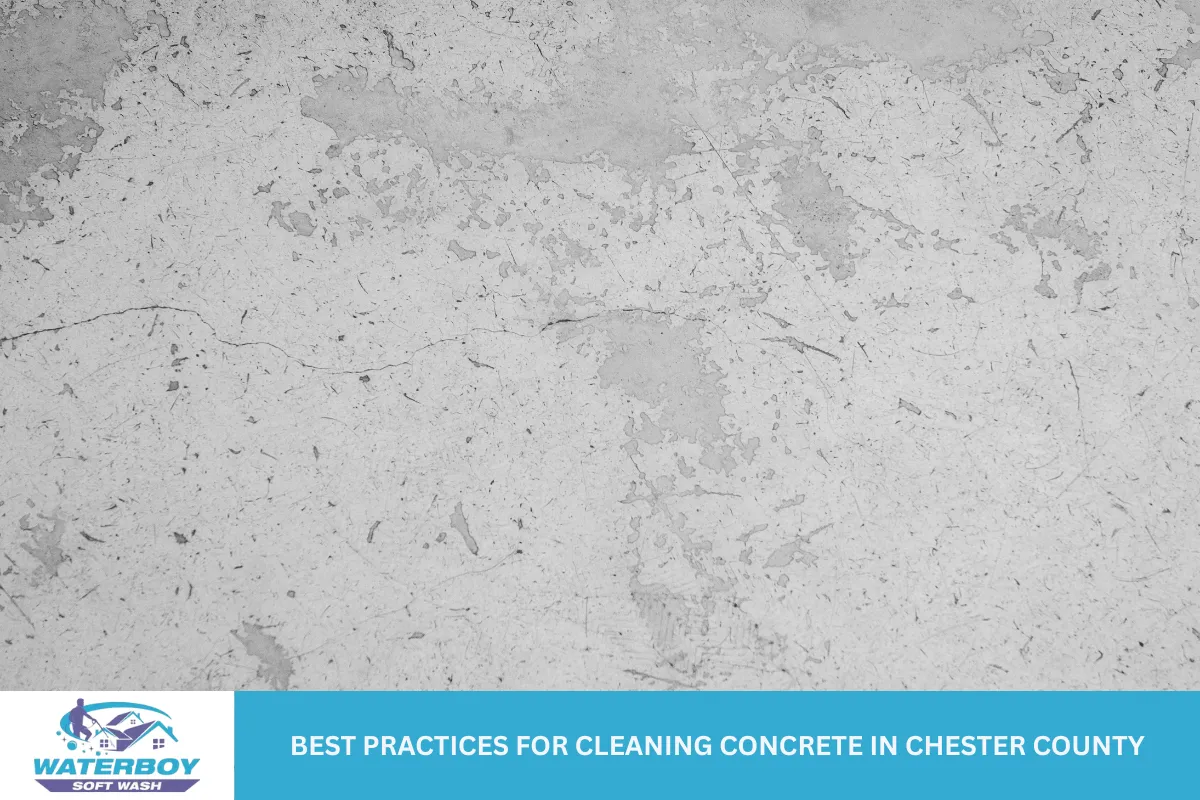
Chester County’s seasonal weather and diverse architecture require a thoughtful approach to concrete maintenance. Here are recommended practices for long-lasting, effective concrete cleaning:
- Perform a visual inspection before cleaning to identify cracks, surface wear, or loose materials.
- Always test a small hidden area before applying any cleaner or pressure washing to the entire surface.
- Avoid high-pressure settings when working with delicate or decorative concrete types.
- Use the right tools and nozzles to control water flow and avoid surface damage.
- Apply a concrete sealant after cleaning to protect the surface from moisture and future stains.
These steps help maintain concrete’s strength and appearance, reducing the need for costly repairs later.
Making the Right Decision for Your Property
Deciding how to clean your concrete depends on several important factors, including the surface type, age, condition, and desired results. A newly poured concrete driveway might benefit from a careful pressure wash. At the same time, a decorative stamped patio or an old sidewalk may require a gentler approach.
The key is to match the method to the surface. This ensures the cleaning is not only effective but also safe. In Chester County, where homes vary in age and style, taking the time to understand your concrete can save you time, money, and damage.
Final Thoughts on Choosing the Right Concrete Cleaning Method
Proper concrete cleaning goes beyond appearances—it protects your property, prevents deterioration, and maintains safety for residents and visitors. In Chester County, the decision to pressure wash or use another method depends on understanding your surface and its capabilities.
Taking a cautious and informed approach ultimately pays off. Whether you do it yourself or hire a professional, understanding the strengths and limitations of each concrete type is essential for achieving the best results without causing harm.
Chester County Concrete Cleaning – Water Boy Soft Wash
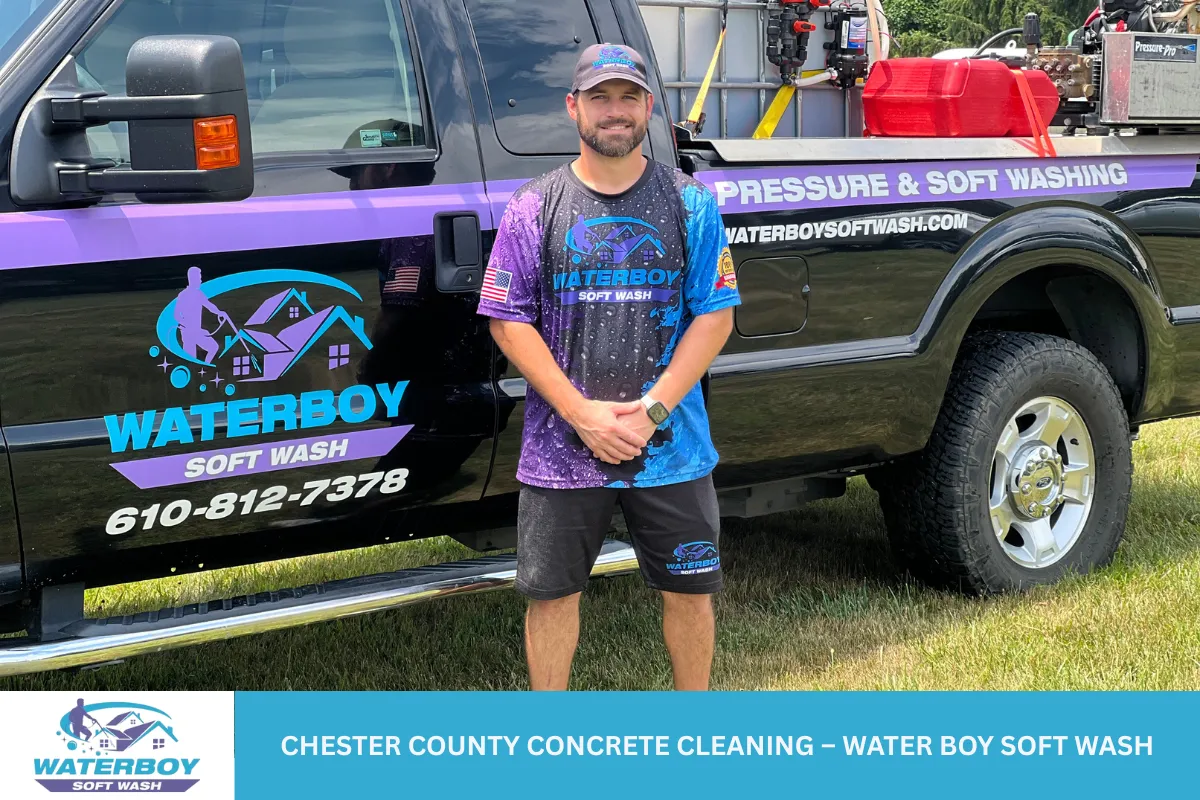
Water Boy Soft Wash specializes in professional concrete cleaning in Chester County, PA, using safe and reliable methods that protect your surfaces while delivering a deep, thorough clean. We target tough buildup, such as dirt, mildew, algae, and stains, using eco-friendly techniques that won’t damage your concrete—whether it’s newly poured or aged and weathered.
Our services are designed to handle all types of outdoor surfaces, including driveways, patios, walkways, and pool decks. With every project, we focus on restoring the look of your property and preserving its condition for the long term. If you want results that are both effective and gentle, call us today at (610) 812-7378—we’re ready to help your concrete look its best!
Frequently Asked Questions About Concrete Cleaning in Chester County, PA
1. How often should concrete surfaces be professionally cleaned in Chester County, PA?
In Chester County, concrete surfaces should be professionally cleaned at least once a year to maintain their appearance and prevent damage. However, certain factors may necessitate more frequent maintenance. The region experiences all four seasons, including heavy rainfall in spring, hot and humid summers, and snow in winter—all of which can leave behind dirt, salt, mildew, and algae. These elements not only discolor the concrete but can also lead to surface degradation if left untreated.
High-traffic areas, such as driveways or walkways, may require more frequent cleaning, especially if they are shaded or surrounded by trees that shed sap, leaves, or pollen. Mold and mildew thrive in moist environments, and Chester County’s humidity can accelerate their growth. If you notice green or black stains, increased slipperiness, or visible discoloration, it’s time for a clean.
Regular cleaning not only improves appearance but also extends the life of the concrete. Pairing this with proper sealing can keep your surfaces looking like new year after year.
2. Can pressure washing damage concrete surfaces?
Yes, pressure washing can damage concrete if not done properly. While concrete is known for being durable, it is also porous. It can be compromised by excessive water pressure, especially if the surface is old, cracked, or unsealed. The key risk is surface etching, where high-pressure water cuts into the concrete, leaving permanent marks or rough patches.
In Chester County, where many homes feature decorative or aged concrete, caution is essential. Pressure washing can also strip sealants, cause discoloration, or worsen existing damage. For decorative surfaces like stamped or stained concrete, even moderate pressure may remove color or top coatings.
Professionals typically use pressure levels between 2,000 and 3,000 PSI for standard concrete, but adjust the settings based on the surface condition. In many cases, a soft washing method using low pressure and a concrete-safe cleaner is the better option. It’s always best to consult with experienced technicians who can evaluate the safest method for your specific surface.
3. What’s the difference between soft washing and pressure washing for concrete?
The main difference lies in water pressure and cleaning technique. Pressure washing utilizes highly pressurized water—typically ranging from 2,000 to 4,000 PSI—to blast away surface contaminants. It’s effective for removing heavy dirt, oil, and tough stains on hard, durable surfaces, such as new driveways or sidewalks.
Soft washing, on the other hand, uses low pressure—typically under 500 PSI—with specialized cleaning solutions designed to break down mold, mildew, algae, and dirt. It’s a much gentler method, making it ideal for decorative, stamped, or older concrete surfaces that could be damaged by strong water force.
In Chester County, soft washing is often recommended for residential concrete areas, such as around patios, pool decks, and decorative walkways. It protects the surface integrity while still providing a thorough clean. The cleaning solutions used in soft washing are typically biodegradable and safe for surrounding landscaping, making it a more environmentally friendly option.
4. Is it necessary to seal concrete after cleaning it?
Yes, sealing concrete after cleaning is highly recommended, especially in a climate like Chester County’s, where weather exposure is a year-round concern. Sealing helps protect concrete from moisture penetration, freeze-thaw damage, chemical staining, UV fading, and erosion. Once a surface is professionally cleaned, it becomes more porous and can absorb water or other substances if left unsealed.
A quality sealer acts as a barrier, extending the life and appearance of your concrete. It also makes future cleanings easier since stains are less likely to penetrate the surface. Sealants are available in various finishes, ranging from natural matte to glossy, and some also enhance the color of decorative or stamped concrete.
Experts recommend resealing every 2 to 3 years, although high-traffic areas may need more frequent attention. Applying the right type of sealant for your specific concrete type—especially after cleaning—can prevent costly repairs and preserve the look of your property for the long term.
5. Are the cleaning chemicals used for concrete safe for plants and pets?
Many professional concrete cleaning services now use eco-friendly and biodegradable cleaning agents that are safe for both plants and pets when used correctly. However, not all chemicals are created equal, so it’s important to verify that the cleaning products meet environmental and safety standards.
In Chester County, where residential properties often feature landscaped yards, gardens, and outdoor living spaces, using safe products is crucial. Soft washing solutions typically comprise a blend of surfactants and diluted disinfectants that break down organic growth, including algae, mold, and mildew. These are often rinsed thoroughly to prevent residue from affecting nearby plants.
Still, reputable professionals take precautionary steps. These include wetting surrounding vegetation before application, covering delicate plants, and directing runoff away from pet areas or gardens. If you have specific concerns, always ask the service provider about the exact products they’re using and how they plan to protect your property during the cleaning process.
Read more: Common Exterior Cleaning Mistakes to Avoid in Downingtown, Pennsylvania
